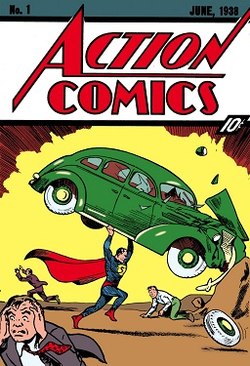Superman Arrives in Metropolis
Listen to the Recess! Clip
| Author | John Cech |
| Air Date | 6/26/2003 |

Superman Arrives in Metropolis Transcript
It’s one of those dreams that comic book aficionados have: opening up a long-forgotten trunk in a relative’s attic and finding a pristine, if slightly musty-smelling copy of “Action Comics” No. 1, for June 1938. The cover shows a green sedan being lifted in the air by a man dressed in blue tights and a red cape and boots, with a scarlet “S” emblazoned on his chest. The comic itself is just thirteen pages long, printed on cheap paper, and costs a dime. Yet today, it is worth a small fortune. In his book, Superman, The Life and Times of the Man of Steel, Les Daniels describes the premise for this fender-shaking debut: “a nameless scientist on a nameless planet being ‘destroyed by old age’ puts his infant son in a spaceship bound for Earth. The baby is found and taken to an orphanage, where his strength amazes doctors. Reaching maturity, he dons the Superman costume and takes a reporter’s job as Clark Kent.” This fragment of background story, taking less than half a page of that first comic, sets a myth in motion.
Of course, there is much more to the story, and this is where it gets really interesting, on a human rather than a Kryptonian scale. Superman — the comic book and later the comic strip, radio series, television show, films, and cultural institution — was the product of five years of dreaming and refinement, of frustrating delays and revisions. Its creators, Jerry Siegel and Joe Shuster, were two poor, struggling (today they’d be called “nerdy”) Cleveland kids who met in high school in 1931 and became fast friends and collaborators because of their mutual interest in science fiction and fantasy. No, it was more than mere interest — it was a complete wish-fulfilling bedazzlement with this emerging genre of pulp fiction and comic strips, which included Buck Rogers and Tarzan. In 1933, the two friends tried their hands at a first version of the Superman idea with a story about a Frankenstein experiment gone wrong. Later that year, they saw one of the new comic books that were being given away as gimmicks to promote (and use up) pages of the Sunday funnies, and soon they had written and inked an entire one of these comic books devoted to their hero, who now had become a strong-man crime-fighter. But the project fizzled, and the boys became young men and went to work as apprentices in the comics business, and kept writing and drawing and dreaming until it was their moment. Because they knew at first hand about being down-trodden, Jerry Siegel later said that they always knew they had “something that the public really would take to its heart.” And they were right: who, during the Great Depression or since, couldn’t identify with the wish to be, as one of Schuster’s sketches for the series declared, “a genius in intellect, a Hercules in strength, a nemesis to wrong-doers.”
Explore This Topic Further
Books
[supsystic-gallery id=11]Film
View an interview with Superman’s creators, Jerry Siegel and Joe Shuster, in this segment from the 1981 BBC documentary “The Comic Strip Hero.”
Further Reading